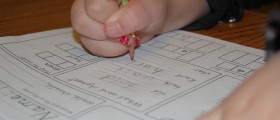
Early education is a very important part of every child's life as it increases chances of advanced intellectual development. Due to this factor, numerous people and organizations are working around the clock in order to provide conditions necessary for enabling all children to get properly educated, even when they are at their kindergarten levels, from birth to the age of 5.
About Early Education
President of the USA, Barack Obama, is committed to providing the necessary support children need in terms of education, directing and collecting funds for making this plan come true.
As far as children are concerned, care and education go hand-in-hand. Thus, the social factors need to be taken into consideration, along with the emotional and intellectual aspects of the children. When the children are properly prepared for attending regular elementary education, they can learn with ease and advance throughout the regular educational program without any problems.
Yet, in order for children to reach this level of learning skills and competence, they need experts to teach them. Thus, an investment needs to be made, focusing on providing the workforce with the necessary education and training.
All in all, early education programs focus on teaching both teachers and children, helping the former to help the latter.
Early Childhood Education Programs
The No Child Left Behind Act introduces the Early Reading First program, which allows grants and other forms of stimulation to preschoolers and school districts, promoting the development of the educational system for young children, focusing primarily on children from poor-income families.
Moreover, the activities involved in the program allow teachers to master all necessary factors for providing the children the necessary knowledge for teaching children through high-quality language, extreme literacy and well-developed pre-reading activities.
It is crucial to help the children develop their phonetic skills, recognizing sounds and letters and learning how to create words by combining these.
All in all, the program enables parents, teachers and children to go through the proper education procedure, resulting in an excellent level of family literacy.
Apart from this program, there are Special Education Preschool Grants and State Grant Programs. These grants are an investment into special education, helping children with disabilities learn all the necessary things they need for being successful in school. This program provides help for all disabled children from their first day of life, until they are 2 years old, encompassing support for the parents as well.
As for the Department of Health and Human Services Programs, the Child Care Bureau concentrates of allowing children with high-quality, affordable and available child care for all families needing it. Thus, this bureau funds states, territories and even tribes, helping those who cannot afford a proper education for their children. There are many sub-programs which stem from the Child Care Bureau, focusing on various aspects of early childhood education.
Some programs like Head Start fund both children under the age of 5 and their families, including pregnant mothers.
Research Studies
Numerous studies focus on researching the early childhood education and its positive effects, providing crucial information to parents, teachers and all other people involved in education of this sort.
Early Childhood Longitudinal Study follows the entire developmental process of children. Starting at Birth Cohort, which helps parents, care providers, teachers, decision makers and other researchers, as far as information on early education is concerned.
The study covers the kindergarten age too, starting from 1998-99 and still ongoing. This study provides information about all the children who enter kindergarten and go further to schools, monitoring their progress until they reach the 14th grade.
Special education has its own supporting study too, called the National Early Intervention Longitudinal Study, keeping track of more than 3,338 children who are disabled, gathering information about their families, their own characteristics and the effects education has on them.
Furthermore, 3,000 children and more are followed by the Pre-Elementary Longitudinal Study as they go through their preschool years and advance into their elementary education. The study started following the children once they were 3 to 5 years old.
Finally, there are plans for some other researches. One of these is going to be conducted by the National Research Center, focusing on early childhood education, possibly solving any problems which are found in the process.
Other researches currently focus on the school curricula and the educational systems of various educational facilities or place emphasis on a specific subject like mathematics, science. On the other hand, some researchers focus on certain skills like reading and writing, assessing young children and helping them get the best out of their education, as far as these skills are concerned. The mathematics and science, as well as the quality reading and writing grant programs are focused on teachers as well, working on improving their knowledge and teaching capabilities.
All in all, early education is crucial for children, since it provides a steady basis for all the knowledge and information the child will be exposed to later, during elementary and high levels of education. This importance is more and more noticed by many governmental and non-governmental organizations, working together in order to provide a successful and productive educational system for our little ones, allowing them to develop their full potentials.
















Your thoughts on this
Loading...